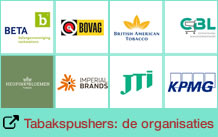Leading advertising magazine falls for Philip Morris’ PR trap
22 May 2025
Global trade publication for the advertising industry, AdWeek, recently provided a platform to Philip Morris International (PMI) by inviting senior vice president Marian Salzman to appear on a podcast. During this episode, misleading information was spread, and a deadly industry was normalized.
By Eline Goethals*
The marketing podcast ‘The Speed of Culture’ weekly invites ‘leading innovators and disruptors’ in collaboration with American advertising trade magazine AdWeek. Typically, interviews and insights are shared from companies such as Google, Samsung, TikTok, and Cadillac. In a recent episode, however, host Matt Britton invited Marian Salzman, senior vice president special projects at Philip Morris International.
Salzman previously worked as a ‘trendspotter’ and communication strategist, including at advertising agency Havas. Since 2018, she has been working at PMI, where she was responsible for the ‘Unsmoke’-strategy and the launch of the company’s heated tobacco products in multiple countries.
According to the charter of the American Association of Advertising Agencies (4As), advertising agencies must refrain from disseminating false or misleading information. But trade magazine AdWeek does exactly that with this Salzman interview. After analysing the episode, three problematic aspects become apparent.
Normalization of a deadly company
First, even apart from the content: this is not just an interview but a PR platform for reputation rehabilitation. PMI cannot be seen as an ‘ordinary company’: it sells products that unnecessarily kill millions of people worldwide. By positioning the company as an ‘innovator’ and presenting Salzman as a ‘thought leader’ that we should be ‘fans’ of, AdWeek actively helps normalise a deadly industry.
In the podcast, Salzman is portrayed as an inspiring professional. She talks about her ‘smart colleagues’ and how PMI helps her obtain a master’s degree from Johns Hopkins. It’s a calculated attempt to give the company a human face.
But this is the very company that has repeatedly been caught lying and manipulating: from decades of denying the harmfulness of smoking, to misleading claims about so-called ‘light’ cigarettes, and even active involvement in tobacco smuggling. These are not isolated incidents but a systematic pattern of deception, and nothing suggests this strategy has changed in recent years.
Salzman’s public role fits into PMI’s long-term strategy to reposition its image as a “reliable and innovative partner in public health” – a strategy based not on health, but on market expansion.
False information and half-truths
Second, the content of the podcast episode is full of misleading claims. Salzman states that PMI has already invested more than $ 14 billion in their alternative ‘smoke-free’ products. What she doesn’t say is that this is a fraction of their global revenue. She claims these products are a ‘better choice’ than smoking, but conceals that these products are also harmful, that evidence about their relative safety is mixed, and that for many people they actually serve as an entry point to nicotine addiction.
Salzman remains silent about the hundreds of doctors raising the alarm, both in the Netherlands and in other parts of the world. As Wanda de Kanter, pulmonologist and chair of the Youth Smoking Prevention Foundation, previously stated: “There is no evidence that these new products actually help people quit smoking. Instead, we see them addicting a new generation to nicotine.” Recently tobacco industry watchdog STOP concluded that there is no evidence for reduced health risk from heated tobacco. Podcast host Britton also fails to ask any critical questions about this.
Uncritical about alternatives
About her job Salzman says: “It’s a wonderful role because it’s really about giving adult smokers better options. The best choice for any smoker is to quit tobacco and nicotine altogether. No question about that. But for those who don’t quit, and a lot of people won't quit, the best choice is to switch to these better alternatives.” This too is misleading. Research shows that a majority of smokers do want to quit, but hard nicotine addiction prevents them from doing so.
Moreover, only positive aspects of vaping, heated tobacco, and nicotine pouches are discussed in the podcast. At no point is it mentioned that many people actually start using nicotine and tobacco because of these ‘alternative’ products.
If PMI truly believed in its own message that ‘combustion’ is the enemy, as Salzman claims in the podcast (“What you learn about the burn, you just want to run away from it”), why does the company continue to sell cigarettes? Recent research published in Tobacco Control shows that PMI is not selling fewer cigarettes out of conviction, but simply because the entire market is declining.
Original interview edited
Lastly, but even more problematic and telling: certain passages in the interview were later removed from the official episode. The original interview with Salzman was published on YouTube, but this first version differs significantly in several places from the final version from AdWeek.
In the original recording, Salzman claims about PMI’s heated tobacco products: “By eliminating combustion, you can reduce the production of harmful chemicals by as much as 95 per cent.” The percentage was subsequently cut from the official podcast version. The reason seems clear to us, it is a tenacious myth based on a wild guess without scientific evidence. Was this cut at the initiative of PMI or by AdWeek itself?
‘Nicotine is not the enemy’
In another omitted passage, Salzman says: “The anti-tobacco activists have done a good job of conditioning people that cigarettes are a bad choice. The new battle might be around nicotine, which in and of itself is not the enemy.” In other words: nicotine is downplayed, and by stating that nicotine is not the enemy, Salzman moves closer to normalizing chronic nicotine use, even without smoke. This raises suspicions that PMI’s strategy is not so much about health, but about maintaining an addictive business. This segment was also removed afterwards.
Finally, a passage in which Salzman draws a parallel between PMI’s ‘smoke-free’ products and GLPs (weight loss medication) was also removed: “Our smoke-free products are to cigarettes what GLPs are to junk food.” This is a medical claim without basis and a way to frame the ‘smoke-free’ products as ‘health products’. And of course, if PMI itself says their products are the alternative to a harmful addiction, why do they still sell cigarettes in more than hundred countries? The comparison with GLPs invites such uncomfortable questions. Was it deleted for this reason?
A harmful partnership
By facilitating the above narratives from PMI, AdWeek actively helps in the rehabilitation of a deadly industry that places profit above human lives. After her transfer to PMI, Salzman, for years a respected giant in the communications sector, is still offered a platform by the advertising world from time to time. In some cases, this is prevented in time, like a few years ago when she was invited for an advertising industry event in the Netherlands, which was cancelled after fierce protests.
With this article, we call on AdWeek and podcast host Matt Britton to remove this episode, publicly acknowledge their mistake, and include a clause in their editorial guidelines that prohibits all collaboration with the tobacco industry.
It is tragic that a talented communications professional like Marian Salzman uses her skills to serve a deadly industry. What a difference she could make if she were to use her talent to protect lives, not to mask harm.
AdWeek and Matt Britton were asked for a reaction. Britton reacted with: “Challenging corporate initiatives you oppose is responsible activism. Targeting the media and those who report for covering individuals at those corporations is censorship. It’s a distinction worth contemplating.”
*Eline Goethals left the advertising world to participate in the first tobacco control fellowship of The School for Moral Ambition
tags: advertisement | smokeless tobacco | healthwashing | tobacco lobby | PMI









 Stichting Rookpreventie Jeugd is geregistreerd als Algemeen Nut Beogende Instelling (RSIN: 820635315 | KvK: 34333760).
Stichting Rookpreventie Jeugd is geregistreerd als Algemeen Nut Beogende Instelling (RSIN: 820635315 | KvK: 34333760).